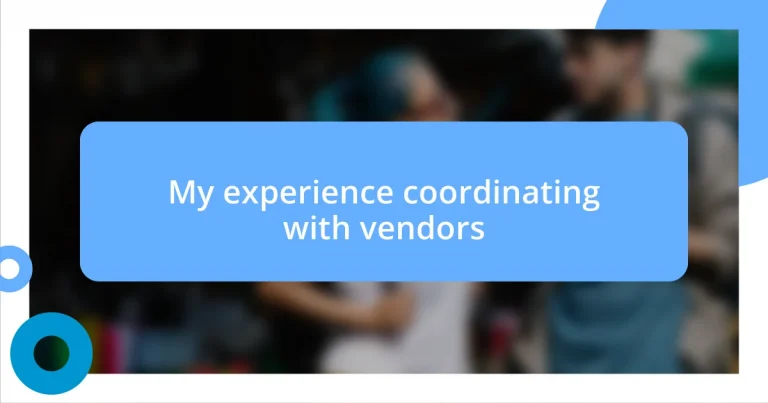Key takeaways:
- Effective communication and clear expectations are essential for successful vendor coordination, helping to prevent misunderstandings and build trust.
- Investing time in building strong relationships with vendors fosters collaboration and can lead to additional perks and creative solutions.
- Utilizing technology for project management and regular check-ins enhances accountability and ensures alignment among all parties involved.
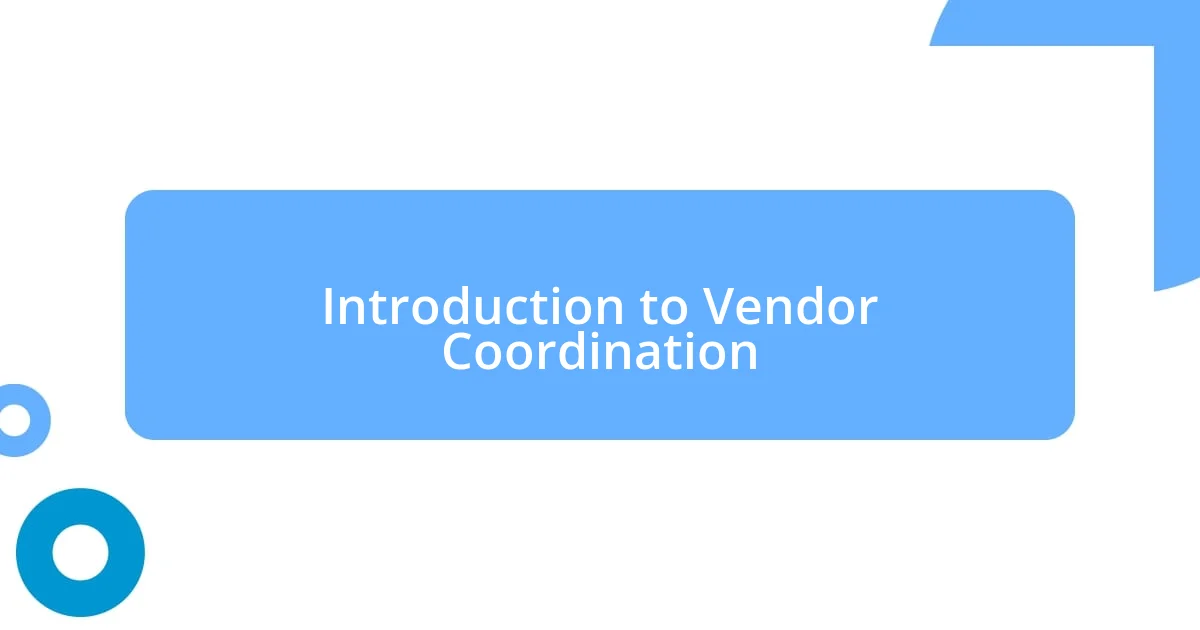
Introduction to Vendor Coordination
Vendor coordination is a vital aspect of any successful project. I still remember my first experience coordinating with vendors for a large event. The excitement was palpable, but so was my nervousness; how would I keep everything organized when I was dealing with so many different personalities and timelines?
As I dived in, I quickly realized that effective communication was key. I made it a point to establish clear expectations right from the start. Have you ever tried juggling multiple tasks while ensuring everyone is on the same page? It can be overwhelming, but I learned that regular check-ins and updates not only build trust but also prevent misunderstandings.
Furthermore, I discovered that fostering strong relationships with vendors can lead to unexpected perks. For instance, I once built a rapport with a catering vendor who went above and beyond, offering me valuable suggestions that transformed the menu. Wouldn’t it be great if every vendor experience turned out that way? Those connections can enhance your project in ways you never anticipated, making the hard work of coordination truly worthwhile.
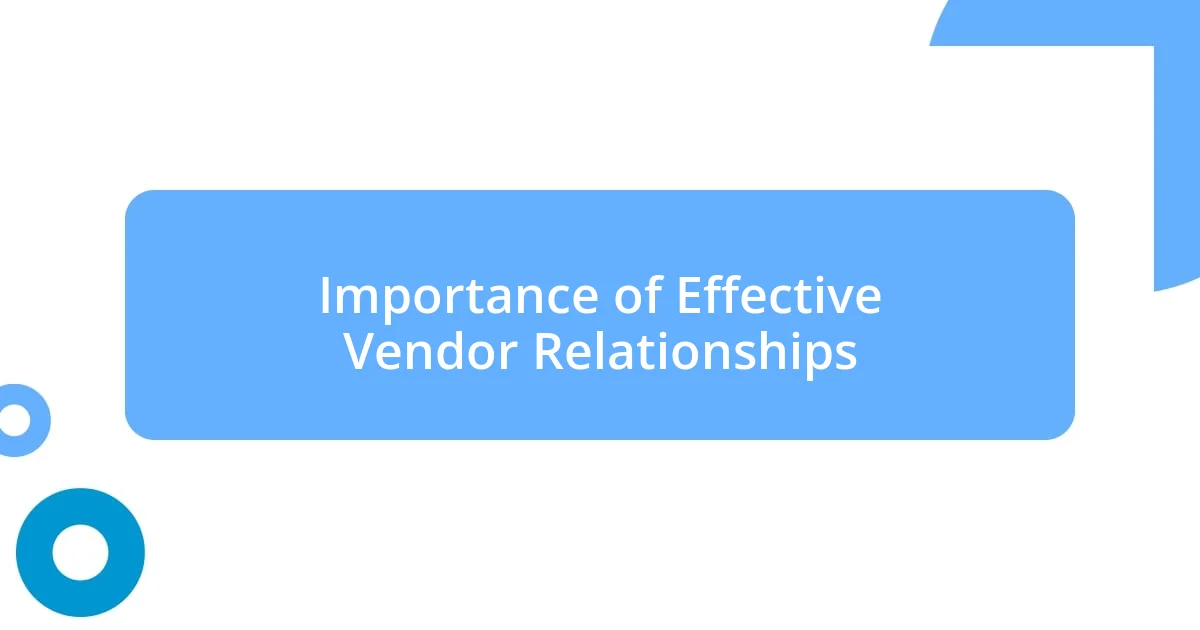
Importance of Effective Vendor Relationships
Building effective vendor relationships is not just a nice-to-have; it’s essential for smooth project execution. In my experience, when I invested time in getting to know my vendors beyond just a transactional level, the results were often extraordinary. For instance, during a corporate event, I took a few minutes to share my vision and goals with a sound technician. The technician then tailored his services to match my needs perfectly, leading to a seamless experience that significantly impressed our clients.
- Strong vendor relationships lead to better collaboration.
- Trust tends to yield more flexibility and creative solutions.
- Vendors who feel valued are more likely to prioritize your projects.
- Excellent rapport can result in additional perks or discounts.
- Open communication fosters a proactive approach, minimizing problems.
Reflecting on these moments, I realize that it’s more than just logistics; it’s about forging partnerships that uplift the entire project. I still recall a florist who not only provided stunning arrangements but shared insightful advice on seasonal blooms that enriched my design. It’s these meaningful exchanges that truly elevate your work and leave a lasting positive impact.
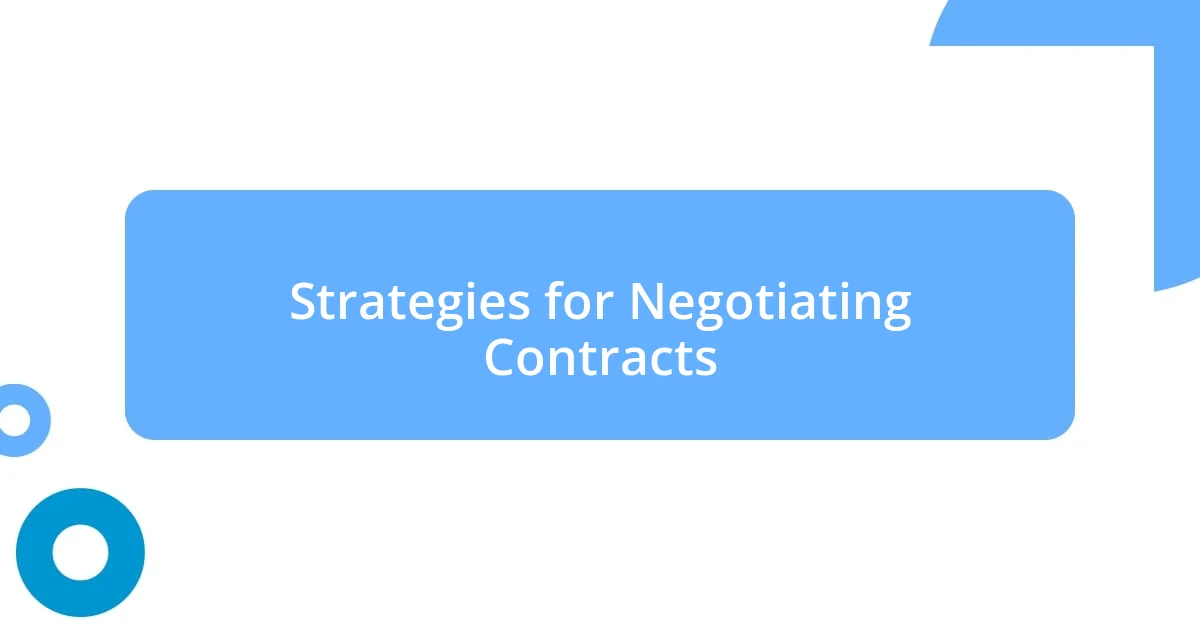
Strategies for Negotiating Contracts
When it comes to negotiating contracts, having a clear understanding of your priorities is crucial. I always make a list of what I absolutely need versus what would be nice to have. This not only helps me focus during negotiations but also provides a framework for compromise. Have you ever been caught off-guard by unexpected costs? I remember a time when I neglected to clarify delivery fees, and it surprised me later in the contract. Clear communication can save you from those unpleasant surprises.
Another effective strategy I employ is presenting information that supports my perspective. I often gather data on industry pricing or examples of services to demonstrate the reasonableness of my requests. A few years back, I used my research on florists’ pricing to negotiate a better deal for an event. By showing them what others were charging, I was able to work out a pricing structure that was beneficial for both sides. It reinforced to me that being well-informed not only boosts my confidence but also levels the playing field during negotiations.
Additionally, I find that maintaining a collaborative mindset can transform the negotiation process. Instead of viewing the vendor as an adversary, I approach our discussions as a team working toward a common goal. During a recent negotiation with a catering service, I asked for input on menu options within my budget. Their suggestions not only helped me stay within budget but resulted in a menu that impressed my guests. This experience taught me that negotiations don’t have to be confrontational; when vendors feel like partners, everyone wins.
| Strategy | Benefit |
|---|---|
| Clarify Priorities | Avoids misunderstandings and unexpected costs |
| Present Supporting Data | Strengthens negotiation position |
| Maintain Collaboration | Turns adversarial negotiations into partnerships |
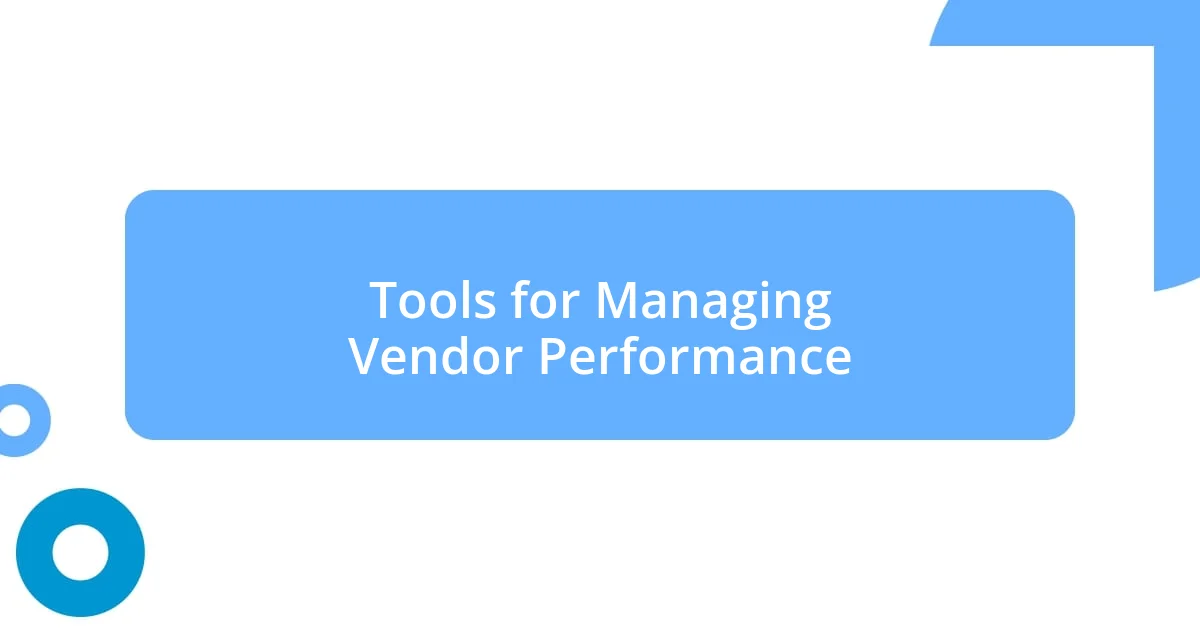
Tools for Managing Vendor Performance
When it comes to managing vendor performance, I’ve found utilizing technology truly makes a difference. One of my go-to tools is a project management software like Trello or Asana. These platforms allow me to set clear timelines and delegate responsibilities, keeping everyone on the same page. Have you ever faced delays because a vendor didn’t understand their role? I definitely have, and using these tools has significantly reduced those instances.
Another effective tool is performance tracking software, which helps monitor key performance indicators, or KPIs. For example, during a major event, I kept track of delivery timelines, responsiveness, and quality of service using a simple spreadsheet. This allowed me to identify areas for improvement and have candid conversations with vendors when expectations weren’t met. It’s a bit like having a scorecard for your vendors; it promotes accountability, and it can enhance collaborative discussions, turning critiques into constructive feedback.
Finally, I can’t emphasize enough how important regular check-ins are. Using communication tools like Slack or Zoom, I schedule brief updates with my vendors to discuss progress and any emerging challenges. These informal chats can uncover potential issues before they escalate. I’ve had instances where a casual conversation revealed a vendor was unaware of specific expectations, and addressing that proactively saved me from significant headaches down the line. Engaging in dialogue not only helps maintain a strong relationship but also ensures everyone is aligned towards the same goals.
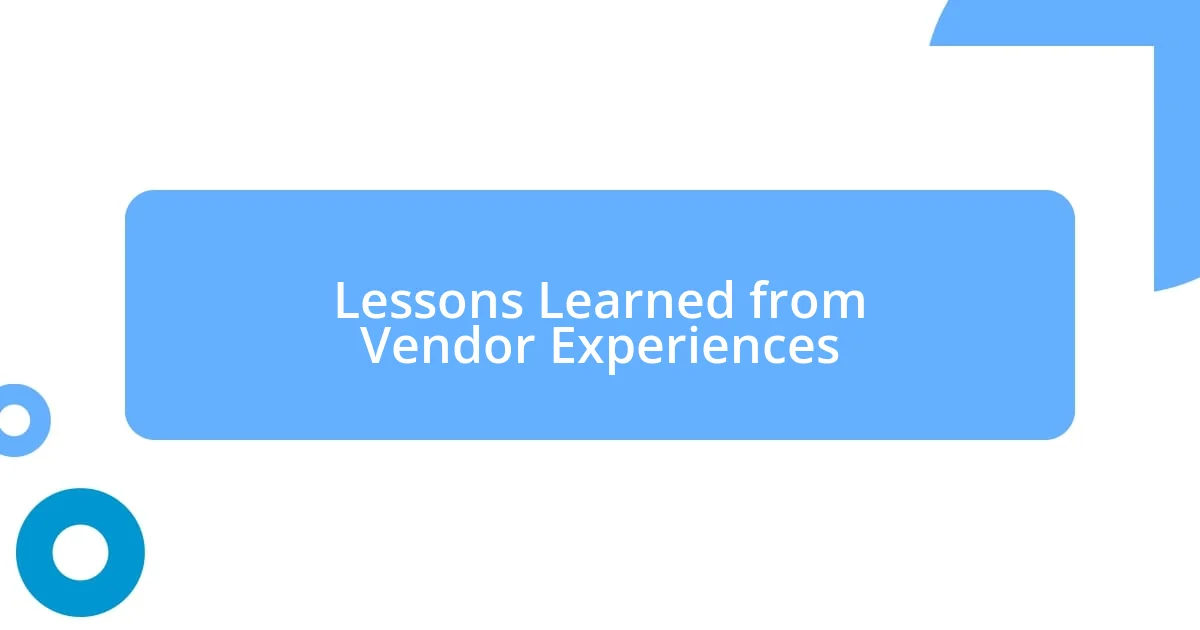
Lessons Learned from Vendor Experiences
Vendor experiences can be a mixed bag, and I’ve learned that flexibility is essential. I recall a time when a vendor had to change the delivery date at the last minute due to unforeseen circumstances. Originally, I was frustrated, but it taught me the importance of having backup plans and being adaptable. What if we hadn’t had an alternate solution ready? The event could have turned chaotic. Now, I always try to build a little buffer into any timeline whenever possible.
Communication has emerged as a key lesson as well. I once assumed a vendor understood a specific requirement just because I mentioned it in passing. However, when the delivery arrived, it was totally off-target. This miscommunication led to a scramble that I wish I could have avoided. Ever faced that kind of panic yourself? It was a wake-up call for me—now, I make it a point to put everything in writing, confirming key details to ensure we’re on the same page. Clear communication is truly a lifeline.
Lastly, I’ve found that building solid relationships with vendors can significantly affect outcomes. There was a supplier I worked with for several months; we shared jokes and stories during our calls. When I faced unexpected issues, they bent over backward to help because they valued our rapport. Have you ever noticed how relationships can turn into lifelines? It showed me that taking the time to nurture these connections can lead to better support when you need it most. After all, a relationship grounded in trust often translates to exceptional service.












